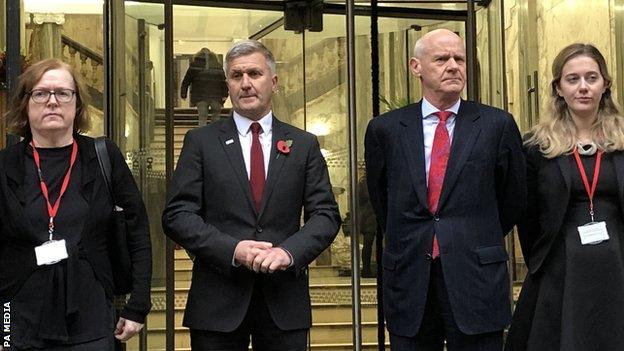Dr Freeman tribunal: Former British Cycling medic fails in bid to have charges thrown out
- Published

Mary O'Rourke (left) is defending Dr Richard Freeman (second left) at the medical tribunal in Manchester
Dr Richard Freeman has failed in his bid to have four remaining charges thrown out at his medical tribunal.
The former British Cycling and Team Sky medic has admitted 18 of 22 charges against him to determine whether he is fit to practise.
They include him ordering testosterone - but he denies it was to help boost an athlete's performance.
After two days of deliberation the tribunal chair said there was a "case to answer for all outstanding matters".
Freeman is accused of ordering for 30 sachets of Testogel to British Cycling headquarters in 2011 knowing or believing it was to enhance intended to enhance an athlete's performance.
The medic, who is yet to give evidence at the tribunal, claims the delivery was for former British Cycling performance director Shane Sutton, a claim the Australian denies.
The hearing has now been adjourned until Monday because of a "health issue" concerning Dr Freeman, who has previously been diagnosed with bipolar disorder.
His defence lawyer Mary O'Rourke QC said he was "too emotional" to attend the hearing on Friday, although he did arrive at St James' Building in Manchester to be told of the panel's decision.
O'Rourke said that Dr Freeman had seen his psychiatrist in the morning after a "crisis" in the past week, adding: "I'm not going to take risks or play games with his health."
The tribunal is set to continue until Friday 20 December.
But with Freeman yet to give evidence or be cross-examined by the General Medical Council, who are bringing the case against him, new dates might need to be scheduled for the tribunal to conclude.
Freeman has only attended the hearing for one day since Sutton called him "spineless" during a stormy day in which the former British Cycling and Team Sky coach stormed out.
The tribunal has already been postponed from February because the doctor was ill and O'Rourke suggested they might need four weeks to reach a conclusion.
She said that in addition to Freeman's evidence and cross-examination, there were still "a number of outstanding issues" including the GMC potentially gaining access to a document held by the Daily Mail newspaper.
How did the tribunal come to its decision?
The panel said there were a number of factors it considered when deciding to reject the defence's application to have the four remaining charges thrown out.
It said that based on Sutton's evidence, which the defence tried to throw out, and analysis from endocrinologist Dr Quinton, it was capable of establishing that the testosterone was "not clinically indicated" for Sutton.
It also considered charges that Dr Freeman had admitted, including ordering the testosterone despite it being a banned substance under the World Anti-Doping Agency code, lying to two colleagues - former British Cycling head of medicine Dr Steve Peters and former physio Phil Burt - about the delivery, and then trying to cover it up.
There was also reference to Dr Freeman lying "a further time" to a UK Anti-Doping investigation.
Despite O'Rourke saying there was not a "scintilla of evidence" to prove that Freeman ordered the Testogel knowing or believing it was to enhance and athlete's performance, the panel said "a reasonable jury could, on one possible view of the evidence, be entitled" to draw that conclusion.
The tribunal continues.